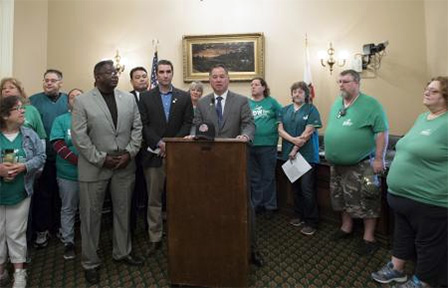On Tuesday, via a 12-8 vote, Assembly Bill 1356 moves forward which aims to improve access to cannabis across California.
Under the bill introduced by Assemblymember Phil Ting, it will require local jurisdictions, where more than 50% of voters supported Proposition 64, to issue one cannabis retail license for every four onsite liquor consumption licenses.
On April 11 when the bill was introduced, Ting said:
“Californians voted for Prop. 64 to replace the illicit market with a legal system that would grant Californians safe access to cannabis products, while also creating good jobs and significant tax revenue,” said Assemblymember Ting, author of AB 1356. “However, these goals can only be fully realized if enough licenses are granted to meet existing demand. This bill will ensure the legal market can succeed.”
“When California voters supported Prop. 64 they made clear the importance of access to cannabis products. For many, including seniors, veterans, young people with childhood maladies and individuals with disabilities, cannabis serves an important medical purpose. Many cities and counties are currently not providing this access to their medically challenged constituents, even when a majority of their constituents voted for Prop. 64. Banning and limiting access to cannabis in these jurisdictions only fuels the illicit market in our state,” said Assemblymember Reginald Jones-Sawyer (D-South Los Angeles). “I am proud to co-author AB 1356 (Ting), a measure that will ensure local governments respect the will of the voters by increasing access to safe cannabis products from the legal cannabis market.”
Nearly two and a half years after the passage of Prop. 64, and a year and half after the introduction of the California legal retail cannabis market, approximately 76% of California cities and counties have banned cannabis retail businesses.
LEGISLATIVE COUNSEL’S DIGEST
The Control, Regulate and Tax Adult Use of Marijuana Act (AUMA), an initiative measure approved as Proposition 64 at the November 8, 2016, statewide general election, authorizes a person who obtains a state license under AUMA to engage in commercial adult-use cannabis activity pursuant to that license and applicable local ordinances. The Medicinal and Adult-Use Cannabis Regulation and Safety Act (MAUCRSA), among other things, consolidates the licensure and regulation of commercial medicinal and adult-use cannabis activities.
MAUCRSA imposes duties on the Bureau of Cannabis Control in the Department of Consumer Affairs, the Department of Food and Agriculture, and the State Department of Public Health with respect to the creation, issuation, denial, suspension, and revocation of licenses issued pursuant to MAUCRSA. MAUCRSA, beginning on March 1, 2023, and on or before March 1 of each year thereafter, requires each licensing authority to prepare and submit to the Legislature an annual report, containing specified information, on the authority’s activities and post the report on the authority’s internet website.
This bill would delay the requirement of that report until March 30, 2023, and on and before March 30 of each year thereafter.
AUMA authorizes the Legislature to amend the act to further the purposes and intent of the act with a 23 vote of the membership of both houses of the Legislature, except as provided.
This bill would declare that its provisions further specified purposes and intent of the Control, Regulate and Tax Adult Use of Marijuana Act.
Digest Key
Vote: 2/3 Appropriation: NO Fiscal Committee: NOYES Local Program: NOYES


10 comments
I think this is a great idea!
Agreed. Finally there could be safe, legal access to cannabis in CA. Local governments don’t want to do their job and license these legal cannabis retail even when it means denying patients access to cannabis they need to treat their health conditions. Local governments that don’t license legal cannabis retailers are endorsing the operation of illegal cannabis retailers that already exist in their communities. If local governments can’t figure out how to do their jobs on this they shouldn’t expect anything short of the state making them do it.
This will saturate the state with pot shops. The cartels ain’t gonna like this.
I thank God every day that I’m not a DOPER or STONER!
Me too! Now, we will have to dodge the stoners on the roads. Another thing to worry about.
Yeah! Let’s do it! Let’s let everyone have access to MIND ALTERING drugs! Like alcohol isn’t enough! The dope stays in your system for a very long time@ Way to go! Like we don’t already have enough STRENCH around this state!
This is just to force Cannabis sales to increase tax revenue. CA state again acts like dictators. By people’s vote, directly or indirectly, Cannabis is illegal on federal level, legal on state level, and illegal in some communities. Let the communities decide on their own! What CA does is like if the feds would enforce their law in CA.
The feds must just do it. It seems that the DOJ has gotten a lot of complaints.
Who are those two people on the extreme right in that photo? He looks like he’s pregnant and she must have a size 78 waistline! What total slobs! See what smoking “recreational” dope will do to you?
I saw those two! Oh my GOD! Fat slobs!
Comments are closed.